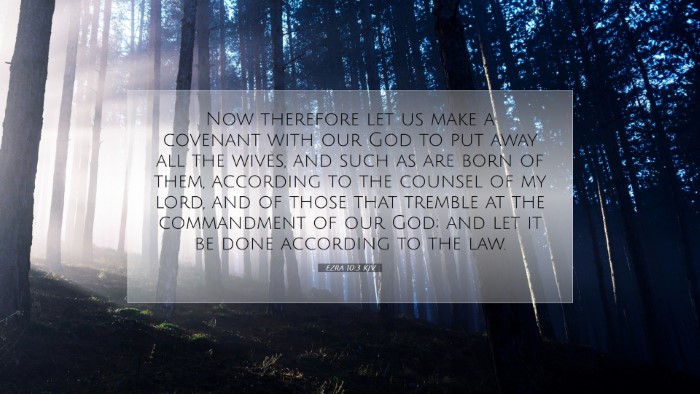Commentary on Ezra 10:3
The verse Ezra 10:3 states: "Now therefore, let us make a covenant with our God to put away all these wives, and their children, according to the counsel of my lord and of those who tremble at the commandment of our God; and let it be done according to the law." This poignant call to repentance and covenant serves as a critical juncture in the scriptural narrative, revealing deep themes of communal responsibility, fidelity to God, and the transformative power of covenant.
Contextual Background
To fully appreciate Ezra 10:3, it is important to understand the historical and spiritual context in which it arises. The exiles returned to Jerusalem under Ezra’s leadership faced significant challenges, primarily stemming from intermarriage with the surrounding peoples, which posed a threat to their distinct identity as God's chosen people. This straying from the covenantal path necessitated a profound response informed by both the law and the prophetic traditions.
Insights from Commentators
Matthew Henry's Perspective
Matthew Henry emphasizes the gravity of the situation faced by Ezra and the returned exiles. He notes that the intermarriages represented a severe breach of the Mosaic law, which called for separation from foreign nations to maintain spiritual purity. Henry highlights the following points:
- Covenantal Faithfulness: The proposal to make a covenant reflects the seriousness with which the Israelites approached their relationship with God. It signifies a commitment to restore their dedication and to act in accordance with divine commandments.
- Repentance and Collective Action: Ezra's call is not merely personal but communal, underscoring that sin has corporate implications. The assembly’s agreement to make changes emphasizes corporate repentance.
- Reflective Counsel: The phrase "according to the counsel of my lord and of those who tremble at the commandment" suggests a collective attitude of reverence for God’s commands, which is crucial for any meaningful covenant making.
Albert Barnes' Analysis
Albert Barnes provides a thorough exploration of both the legal and emotional dimensions present in Ezra 10:3. His observations include:
- Crisis of Identity: Barnes discusses how the intermarriage crisis signifies a larger identity struggle for the people of Israel, raising questions about loyalty to God versus cultural assimilation.
- The Weight of Sin: Barnes articulates the weight of sin in the lives of those returning from exile, noting how it led to profound distress and the necessity of drastic measures for restoration.
- Following Divine Law: Barnes further emphasizes that any actions taken must align with God's law, which serves as the foundation for their covenant. This highlights God's sovereignty and the expectation of obedience.
Adam Clarke's Commentary
Adam Clarke offers additional insights into the spiritual ramifications of the decisions made by Ezra and the people:
- Understanding of Covenant Theology: Clarke explains that their commitment to put away foreign wives and children demonstrates a profound understanding of covenant theology, where separation from sin is necessary for faithfulness to God.
- Emotional and Social Impacts: Clarke notes the emotional toll such decisions would have on the families involved, suggesting that although necessary, these actions were heavy with consequences.
- Call to Unity and Integrity: Clarke underscores that the call for unity in action was rooted in a desire for integrity among God’s people, suggesting that spiritual renewal requires community consensus and action.
Thematic Reflections
Across these commentaries, several key themes emerge that are relevant for pastors, theologians, and students alike:
- Responsibility of Leadership: Ezra’s leadership exemplifies the importance of courageous and faithful guidance. Pastors are reminded of their role in navigating difficult moral and spiritual landscapes.
- Corporate Repentance: The call for corporate action serves as a pivotal lesson in communal accountability, suggesting that healing and restoration often require collective acknowledgment of wrongdoing.
- Holiness versus Cultural Compromise: The challenge of remaining distinct as God’s people remains relevant for contemporary believers. The balance between engagement and separation asks modern Christians to reflect on their own cultural associations.
- Transformative Power of Covenant: The act of covenanting together not only signifies renewal but also promotes a transformative approach to their relationship with God, illustrating the power of collective commitment.
Conclusion
In conclusion, Ezra 10:3 captures a moment of profound introspection and collective action. The call to put away foreign wives and children speaks to issues of identity, covenant, and fidelity that resonate through both the ancient text and into the contemporary context of faith communities. By drawing from the rich insights of Matthew Henry, Albert Barnes, and Adam Clarke, we are reminded of the weighty call embedded within this verse—a call not to be taken lightly but to be viewed as an invitation to renewed covenantal faithfulness.


